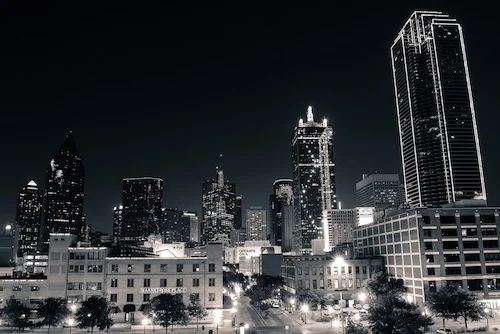When visitors come into the well-supplied kitchen of our home, The Art House, with its 60” Wolf range and side-by-side refrigerators, they often rightly ask, “Do you like to cook?” I almost always stumble over a simple yes or no answer. After living most of my adult life feeding hungry people, I am very interested in food and cooking. But the interest has come alongside the necessity. Cooking has been unavoidable, a skill developed with use. Thankfully, I was inspired early on to see the kitchen as a wholly creative and meaningful place to work, so I have leaned into all the need with an imagination formed by those ideas.
With Bread
Company. Campaign. Champagne. Champion. Companion. Familiar words that sound so alike because they all spring from the same medieval French and Latin roots. “Com” = “with” and “Pan” = “bread.” “Camp” (champ) = “open country or field.” These words are cousins in etymology and function. To be a companion is literally to share bread with someone. To share bread with someone is to keep their good company. To keep their good company is to be their champion. And to be their champion is to be their defender, to walk among them and eat with them.
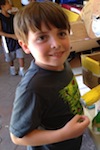 For every moment I paid attention, I wonder how many moments I missed — not just with the children around me, but also with the adults I interact with who might have needed an encouraging word or simply a friend who would listen. Maybe being a hero doesn’t require superhuman abilities, but simply the willingness to pause and pay attention and listen.
For every moment I paid attention, I wonder how many moments I missed — not just with the children around me, but also with the adults I interact with who might have needed an encouraging word or simply a friend who would listen. Maybe being a hero doesn’t require superhuman abilities, but simply the willingness to pause and pay attention and listen.
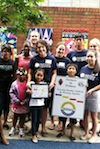 Artists and gardeners aren't the only ones who should be creating or coaxing life. I've started six urban gardens in three different cities and I can't stress how essential it is to co-create with those whom you want to build bonds. It is incarnational and it is transformational. It works across languages and ages. Three sunflower seeds can be enough. A tomato plant is even better. A public art project is outstanding.
Artists and gardeners aren't the only ones who should be creating or coaxing life. I've started six urban gardens in three different cities and I can't stress how essential it is to co-create with those whom you want to build bonds. It is incarnational and it is transformational. It works across languages and ages. Three sunflower seeds can be enough. A tomato plant is even better. A public art project is outstanding.
 There, floating with these beautiful newfound sisters in the cool, emerald green water of the Frio River, amongst the tiny flickering fish and the long blades of grass, I felt my heart settle into the deep quiet. I didn’t have an ongoing grocery list running through my mind. I wasn’t worried about the kids and whether or not my husband had remembered the sunscreen. I did not even have to fight the insecurities that normally gnaw at me about my body in a swimsuit. No, for the first time in a great long while, I let go.
There, floating with these beautiful newfound sisters in the cool, emerald green water of the Frio River, amongst the tiny flickering fish and the long blades of grass, I felt my heart settle into the deep quiet. I didn’t have an ongoing grocery list running through my mind. I wasn’t worried about the kids and whether or not my husband had remembered the sunscreen. I did not even have to fight the insecurities that normally gnaw at me about my body in a swimsuit. No, for the first time in a great long while, I let go.
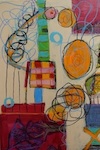 I have learned that on my own, in my response to the call of creation and the Creator, I am finite. I understand a few small truths and can reach only so far alone. I cannot teach myself all that I need to know and understand. When I find myself pushing the constraints of this finitude, I need the gifts of others to pull me through the fog into the next clearing. I will not reach my destination — nor even understand it — without them. I would like to. I long for independence and self-actualization. I want to do things on my own. But the fact is, I lack much.
I have learned that on my own, in my response to the call of creation and the Creator, I am finite. I understand a few small truths and can reach only so far alone. I cannot teach myself all that I need to know and understand. When I find myself pushing the constraints of this finitude, I need the gifts of others to pull me through the fog into the next clearing. I will not reach my destination — nor even understand it — without them. I would like to. I long for independence and self-actualization. I want to do things on my own. But the fact is, I lack much.
 Now, certainly I am grateful for the cheerful mechanic who diagnosed and replaced my broken alternator last Christmas Eve. And I owe a great deal to the tailor who salvaged the almost-brand new red leather shoes I’d spilled jojoba oil on. But that does not diminish my own satisfaction from improvising an oil plug gasket by sewing together part of a leftover ring from a battery-cleaning kit. Nor does it dim the delight of successfully building a new pad for a seatless chair frame I found on the street.
Now, certainly I am grateful for the cheerful mechanic who diagnosed and replaced my broken alternator last Christmas Eve. And I owe a great deal to the tailor who salvaged the almost-brand new red leather shoes I’d spilled jojoba oil on. But that does not diminish my own satisfaction from improvising an oil plug gasket by sewing together part of a leftover ring from a battery-cleaning kit. Nor does it dim the delight of successfully building a new pad for a seatless chair frame I found on the street. I had thought that this Catholic Mass would be so very different from the evangelical style of worship I was trying to take a break from. And I’d hoped, though I’d hardly admitted it to myself, that I might feel differently here, among the pillars and marble.
I had thought that this Catholic Mass would be so very different from the evangelical style of worship I was trying to take a break from. And I’d hoped, though I’d hardly admitted it to myself, that I might feel differently here, among the pillars and marble. But too much of it was familiar — the anemic guitar, the warbly singers, the optimistic lyrics. Sitting uncomfortably among the singing believers a burn of anxiety scrambled up my esophagus. I was irritated. The air conditioning irritated me. The music irritated me. The congregation irritated me. And my headache showed no signs of abating. Communion was coming, I knew that much from reading ahead in the program. I began to plan my escape.
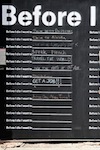 The shift happened slowly — over the course of the past five years as we added three children to our number and I found it more and more difficult to gather the energy to think clearly past 7:00 p.m. But it is unfair to blame entirely on parenthood the erosion of my thought life and the absence of any aspirations beyond surviving today. Perusing design blogs, Pinterest recipes, and perfectly staged photos of a stylized life is just easier than doing the real thing, and it always has been.
The shift happened slowly — over the course of the past five years as we added three children to our number and I found it more and more difficult to gather the energy to think clearly past 7:00 p.m. But it is unfair to blame entirely on parenthood the erosion of my thought life and the absence of any aspirations beyond surviving today. Perusing design blogs, Pinterest recipes, and perfectly staged photos of a stylized life is just easier than doing the real thing, and it always has been. For the force of hunger is a movement toward life, a movement of life. These pangs of hunger are evidence of hope, a sign to keep looking for things not yet seen, not yet at hand. If I were full, would I need to keep traveling? The pilgrimage might come to an early end.
For the force of hunger is a movement toward life, a movement of life. These pangs of hunger are evidence of hope, a sign to keep looking for things not yet seen, not yet at hand. If I were full, would I need to keep traveling? The pilgrimage might come to an early end.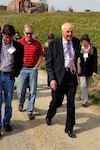 Today, I live in the heart of East Nashville; tomorrow, my husband and I long for a house on 20 acres with goats, chickens, and a great Pyrenees. Today, we acknowledge the harsh realities of life as modern American farmers. Tomorrow, we hope we are up to the challenge. Today, we read, we plot, and we plan. Tomorrow is not ours.
Today, I live in the heart of East Nashville; tomorrow, my husband and I long for a house on 20 acres with goats, chickens, and a great Pyrenees. Today, we acknowledge the harsh realities of life as modern American farmers. Tomorrow, we hope we are up to the challenge. Today, we read, we plot, and we plan. Tomorrow is not ours. As Wendell Berry says, “Tomorrow doesn’t exist.”
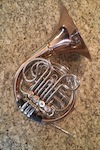 Music and writing seem to be flip sides of the same coin. I view my musical life and my writing life through very different lenses, but both have taken on the patina of parenthood. At least it’s a familiar feeling, like coming home. Home to a small oasis in a sea of dishevelment teeming with maple-syrup-encrusted children, a supportive spouse, and really excellent coffee.
Music and writing seem to be flip sides of the same coin. I view my musical life and my writing life through very different lenses, but both have taken on the patina of parenthood. At least it’s a familiar feeling, like coming home. Home to a small oasis in a sea of dishevelment teeming with maple-syrup-encrusted children, a supportive spouse, and really excellent coffee.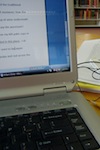 In a time threaded with liminality, all I have to offer is my finite, fallible self, my defenseless skin, and I try to hold onto my capacity to be faithful to the inexhaustible opening of time and whatever glories or agonies attend it. I think about the coming months, this precarious stretch, my parents and my infamous traveling Crock-Pot, the urgencies of art, stacks of sentences that require me to wrap myself around silence and suffering and joy's quiet possibilities so closely that I recognize myself in every note of grandeur and desolation.
In a time threaded with liminality, all I have to offer is my finite, fallible self, my defenseless skin, and I try to hold onto my capacity to be faithful to the inexhaustible opening of time and whatever glories or agonies attend it. I think about the coming months, this precarious stretch, my parents and my infamous traveling Crock-Pot, the urgencies of art, stacks of sentences that require me to wrap myself around silence and suffering and joy's quiet possibilities so closely that I recognize myself in every note of grandeur and desolation.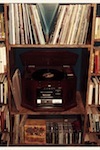 Listening to a record is a physical process. I don't type a name in a search box; I kneel and flip through record sleeves. I stand, and lift the lid, and place the needle just right. The music requires attention, and after a few songs, I move to turn the record over. The records, and the player, take up physical space in my life — a rooted kind of space. They require a physical response, and like the prayers at church, they are repeated. Place and posture, roots and response, attention and repetition: these not only signal that what I'm doing means something, but that it is creating meaning as well.
Listening to a record is a physical process. I don't type a name in a search box; I kneel and flip through record sleeves. I stand, and lift the lid, and place the needle just right. The music requires attention, and after a few songs, I move to turn the record over. The records, and the player, take up physical space in my life — a rooted kind of space. They require a physical response, and like the prayers at church, they are repeated. Place and posture, roots and response, attention and repetition: these not only signal that what I'm doing means something, but that it is creating meaning as well.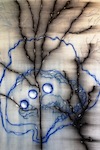 There’s an aloneness to art. We type, paint, sculpt, compose in isolation. We create to realize our theologies, philosophies, hurts, joys, doubts, faiths. We create to understand and work out our lives. And because we worship what we perceive to be the fount of truth and beauty (a God or gods, self, nature, universal energy, materials), we create to worship.
There’s an aloneness to art. We type, paint, sculpt, compose in isolation. We create to realize our theologies, philosophies, hurts, joys, doubts, faiths. We create to understand and work out our lives. And because we worship what we perceive to be the fount of truth and beauty (a God or gods, self, nature, universal energy, materials), we create to worship.
But while worship begins as a personal endeavor, it involves other people around us.
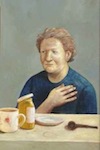 In my letters I tell him, “I wish you were here so I could make dinner for you.” I daydream about how when he is released, eight years from now, I’ll have mastered new cooking skills and will prepare him whatever he wants, however much he wants. I imagine I’ll hold a spoon coated in sauce or frosting up to his mouth and say, “Here. Taste this.” And he’ll close his eyes and taste it and then smile, like we were in a movie or something.
In my letters I tell him, “I wish you were here so I could make dinner for you.” I daydream about how when he is released, eight years from now, I’ll have mastered new cooking skills and will prepare him whatever he wants, however much he wants. I imagine I’ll hold a spoon coated in sauce or frosting up to his mouth and say, “Here. Taste this.” And he’ll close his eyes and taste it and then smile, like we were in a movie or something. So, in order for me to think justly about my world, I have to know my world the way my Creator does — namely, that I belong to my world and it belongs to me. And I belong more immediately and vitally to my immediate surroundings. As it relates to people, justice is rooted in God’s desire for people. In my opinion, that desire is never general and statistical but always particular and personal. So if I am to live more justly and foster truth, goodness, and beauty, I must localize. I must know, personally and particularly, the place and the people to whom I’ve been given.
So, in order for me to think justly about my world, I have to know my world the way my Creator does — namely, that I belong to my world and it belongs to me. And I belong more immediately and vitally to my immediate surroundings. As it relates to people, justice is rooted in God’s desire for people. In my opinion, that desire is never general and statistical but always particular and personal. So if I am to live more justly and foster truth, goodness, and beauty, I must localize. I must know, personally and particularly, the place and the people to whom I’ve been given.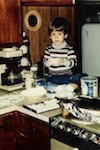 We lined the jars on the familiar countertop, but first things first: blanching and cutting the tomatoes. It takes some waiting, I discovered, but only after scalding my fingers — too impatient to let the water cool down. When I asked Grandma how she knew how much salt and sugar to add to the jars, she looked at me and said, “I do it that way because that’s what my mama always did.” There is no written recipe, only paying attention.
We lined the jars on the familiar countertop, but first things first: blanching and cutting the tomatoes. It takes some waiting, I discovered, but only after scalding my fingers — too impatient to let the water cool down. When I asked Grandma how she knew how much salt and sugar to add to the jars, she looked at me and said, “I do it that way because that’s what my mama always did.” There is no written recipe, only paying attention.Counterclockwise: Keeping an Open Door in a Timekept City
The mechanical clock, first introduced in Benedictine monasteries to regulate the hours of prayer, was perhaps the true starting point of the industrial age. Timekeeping exchanged the imprecise rhythms of an agrarian world, sunrise and sunset, feeding and milking, planting and harvest, for autonomous, mathematical regularity. It was a boon for business, enabling one to promise and deliver products at an exact time.
But the invention of the clock also had unintended consequences. Time became a currency: trafficked, not received. We make time, save time, spend time, waste time.
 Those first weeks of mothering had me in an undead shuffle about the house, eyes heavy, hair sloppily pulled back, last night’s plates still in the sink, sheets in the wash for the third time that week because of my little one’s contributions. I felt totally inadequate, as if nothing I could manage would be enough. The feeling rises as if to drown me at different times for so many reasons, but there is rest in knowing I am not the sum of my accomplishments on a list.
Those first weeks of mothering had me in an undead shuffle about the house, eyes heavy, hair sloppily pulled back, last night’s plates still in the sink, sheets in the wash for the third time that week because of my little one’s contributions. I felt totally inadequate, as if nothing I could manage would be enough. The feeling rises as if to drown me at different times for so many reasons, but there is rest in knowing I am not the sum of my accomplishments on a list.
















